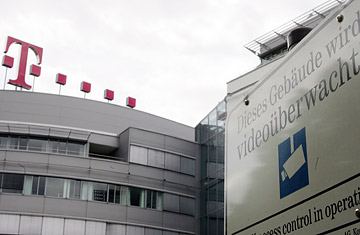
The Telekom Building in Bonn, Germany.
Bristling with code names like "Clipper" and "Rheingold," Germany's latest corporate scandal seems like the stuff of a Cold War espionage novel. But as merely the latest in a series of corporate shenanigans, it may actually reflect the newly sordid style of business at Germany Inc.
The story begins in 2005, when Deutsche Telekom, the former German phone monopoly, was rapidly losing ground to new competitors. Management was under fire and sensitive information was showing up in a steady stream of embarrassing newspaper headlines. Telekom's management was determined to find out who was talking to the press and stop the leaks.
In doing so, some Telekom executives appear to have gone too far. Telekom admitted over the weekend that at least twice in 2005 and 2006, company managers commissioned a private security firm to scrutinize the phone records of journalists and members of its supervisory board. The goal was to discover which corporate executives were talking to journalists. Through cross-checking that information with published newspaper stories, the executives hoped to identify the internal sources of leaks.
The Telekom affair is reminiscent of the pretexting scandal that engulfed U.S. technology firm Hewlett Packard in 2006, costing chairwoman Patricia Dunn her job. It also is the latest in a remarkable series of disclosures about German companies spying on their employees and on journalists. Earlier this year, it emerged that discount retailers Lidl and Schlecker spied on their employees. Electronics giant Siemens has also been accused of spying on employees, and employees alleged that staff doctors at automaker Daimler reported on employees. Even Germany's spy agency, the Federal Intelligence Service (BND), was recently caught spying on German journalists in Afghanistan.
Clearly no isolated case, the Telekom affair is being cited as one more example of waning respect for basic civil liberties. Uwe Wesel, an emeritus law professor at Berlin's Free University, said German courts have generally upheld privacy laws, but that individuals in positions of power appear to have grown impatient with the law. "Although the language of the courts is very clear that this kind of behavior is not allowed, there does appear to be a certain cultural shift taking place," he says. "Perhaps driven by the debate about the threat of terrorism, certain standards are weakening."
Telekom's chief executive, René Obermann, who took over after the events allegedly took place, told reporters that in the summer of 2007, the company became aware of a single case involving improper use of phone records. Assuming no laws had been broken, Telekom handled it as an internal matter. Then in April of this year, far-reaching evidence emerged of a broader, organized plot to spy on members of the supervisory board, including Lothar Schröder, a senior official of the Verdi service workers union; Wilhelm Wegner, the head of Telekom's works council; and possibly Thomas Mirow, deputy finance minister and the German government's representative on the Telekom supervisory board. "The supervisory board is actually supposed to oversee the company's management and not the other way around," Schröder told the daily Handelsblatt.
Obermann alerted the state prosecutor's office on May 14. Friedrich Apostel, the prosecuting attorney in Bonn, where Telekom has its headquarters, said prosecutors would determine in the coming week whether there is sufficient evidence to warrant opening a full-fledged investigation. "We first have to determine whether there is sufficient evidence that a crime was committed," he said.
Whether the goings-on at Telekom were criminal or not, the disclosure has caused a uproar in Germany and further soiled the already tarnished image of the country's corporate leaders. Public anger is growing over the widening gap between the mega-salaries of top corporate executives and the falling purchasing power of workers. That is fueling a political shift to the left that could have an impact on national elections next year.
The extent of damage done by the Telekom affair can be felt in the emotional responses. Hans-Olaf Henkel, a retired IBM executive and former president of Germany's main business lobby, said what happened at Telekom was "reprehensible and disgusting," comparing it to the "methods of the East German Stasi" secret police. "This is not capitalism," he said. "It's not my understanding of the market economy." If a captain of industry condemns Deutsche Telekom with such vigor, the judgment of the average German is not likely to be any more forgiving.
